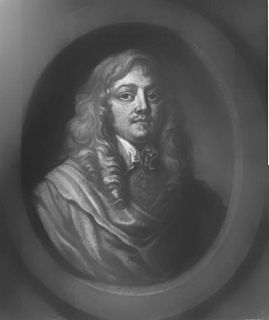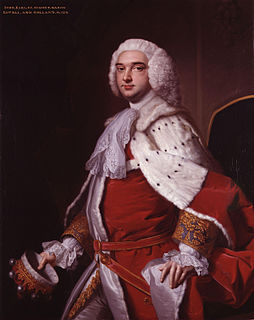
Spencer Perceval was a British statesman who served as Prime Minister of the United Kingdom from October 1809 until his assassination in May 1812. Perceval is the only British prime minister to have been murdered. He was also the only Solicitor General or Attorney General to become Prime Minister.

Earl of Egmont was a title in the Peerage of Ireland, created in 1733 for John Perceval, 1st Viscount Perceval. It became extinct with the death of the twelfth earl in 2011.
John Rawdon, 1st Earl of Moira, known as Sir John Rawdon, Bt, between 1724 and 1750 and as The Lord Rawdon between 1750 and 1762, was an Irish peer.

Thomas Wynn, 1st Baron Newborough, known as Sir Thomas Wynn, 3rd Baronet, from 1773 to 1776, was a British politician who sat in the House of Commons between 1761 and 1807.
Sir Edward Dering, 2nd Baronet was an English politician who sat in the House of Commons at various times between 1660 and 1674.
The Lord High Treasurer of Ireland was the head of the Exchequer of Ireland, chief financial officer of the Kingdom of Ireland. The designation High was added in 1695. After the Acts of Union 1800 created the United Kingdom of Great Britain and Ireland, the Consolidated Fund Act 1816 merged the Irish Inferior Exchequer into the British Treasury with effect from 1817, and the post of Lord High Treasurer of Ireland was abolished. The Superior Irish Exchequer, or Court of Exchequer, remained, led by the Chief Baron of the Irish Exchequer.

John James Perceval, 3rd Earl of Egmont, styled Viscount Perceval from 1748 to 1770, was a British politician.

Admiral George James Perceval, 6th Earl of Egmont, known as the Lord Arden between 1840 and 1841, was a British naval commander and Tory politician.
Charles George Perceval, 2nd Baron Arden PC FRS was a British politician.
Sir Philip Perceval was an English politician and knight. He was knighted in 1638, obtained grants of forfeited lands in Ireland to the amount of 101,000 acres (41,000 ha), and lost extensive property in Ireland owing to the rebellion of 1641. He opposed Charles I's intention of granting the demands of the Irish Confederates in order to employ them in England: joined the parliamentary party in 1644, obtaining a seat in the House of Commons of England as member for Newport, Cornwall, where he threw in his lot with the moderate presbyterians; compelled to retire into the country owing to his opposition to the independents, September 1647.
The Trustees for the Establishment of the Colony of Georgia in America, or simply the Georgia Trustees, was organized by James Edward Oglethorpe and associates following Parliamentary investigations into prison conditions in Britain. The organization petitioned for a royal charter in July, 1731, which was signed by George II in April, 1732. After passing through government ministries, the charter reached the Trustees in June, 1732. Oglethorpe personally led the first group of colonist to the New World colony, departing England on November, 1732 and arriving at the site of present-day Savannah, Georgia on February 12, 1733 O.S. The founding of Georgia is celebrated on February 1, 1733 N.S., the date corresponding to the modern Gregorian calendar adopted after the establishment of the colony.

Sir Richard Percivale of Sydenham, near Bridgwater, Somerset, was an English administrator and politician, also known as a Hispanist and lexicographer. He wrote a Spanish grammar for English readers, A Spanish Grammar, and a dictionary, both included in his Bibliotheca Hispanica (1591); this work was later enlarged by John Minsheu in A dictionarie in Spanish and English.
Thomas Hanmer, of Fenns, Shropshire, was an English Tory politician who sat in the House of Commons from 1734 to 1737.
Charles George Perceval, 7th Earl of Egmont was a British peer and Conservative Party politician of the Victorian era.
John Perceval, 4th Earl of Egmont, styled Viscount Perceval from 1770 to 1822, was a British peer and politician. He was unsuccessful in his attempt to enter the House of Commons in 1790, but entered the House of Lords when he succeeded to the Barony in 1822.
Henry Frederick Joseph James Perceval, 5th Earl of Egmont, styled Viscount Perceval from 1822 to 1835, was a British peer and politician. An alcoholic from an early age, he inherited estates heavily encumbered by debt; avoiding writs for debt shaped much of his life. He was briefly elected a Member of Parliament, but may never have taken his seat, and spent much of his life either abroad or living under an alias. His solicitor took personal advantage of the Earl's incapacity for business, resulting in belated litigation with the next Earl in 1863.








